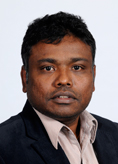Keynote 2
10/4/2018 5:27:38 PMEmbedding Strategic Intelligence in Wireless Communications and Sensing Systems
Sangarapillai Lambotharan
Loughborough University, UK
Email: S.Lambotharan@lboro.ac.uk
Abstract
With the development of the Internet of Things and an abundance of sensors, it is expected that the number of connected devices will reach 50 billion globally by 2020. All these devices will need to operate in a radio congested environment and will compete for the scarce frequency spectrum. This competition for resources between fixed and mobile users presents major challenges to future generation wireless systems and needs a mathematical framework for its solution. Likewise, in emergent wireless networks and sensor systems, there is competitive demand for higher data rates, efficient spectrum utilization and autonomous operation.
The talk presents the successful application of game theoretic methods in economics, political science and evolutionary biology, to embed strategic operation in such wireless communications and sensing systems. In particular, the focus will be on the application of these methods to enable wireless and sensor systems to adapt to changes in their environment, optimise operational parameters in a distributed manner and interact strategically to mitigate disturbances caused by malicious transmitters. The talk will be concluded by presenting a collection of current and future application scenarios including 5G networks, distributed radars, smart grids and data mining.
Biography

Sangarapillai Lambotharan is Professor of Digital Communications and the Head of Signal Processing and Networks Research Group at Loughborough University, UK. He received his PhD degree in Digital Signal Processing from Imperial College London, UK in 1997. His previous appointments include Visiting Scientist at Cornell University, Lecturer at King’s College London, Senior Lecturer at Cardiff University and Research Engineer at Motorola. He has published more than 200 technical journal and conference articles in signal processing for communications, in particular on mathematical optimizations for cognitive radio and MIMO networks. He is a member of the editorial board of IET Signal Processing. His current research interests include massive MIMO, radars, data mining, smart grids, machine learning, game theory and convex optimizations. He is a Senior Member of IEEE and a Fellow of IET.